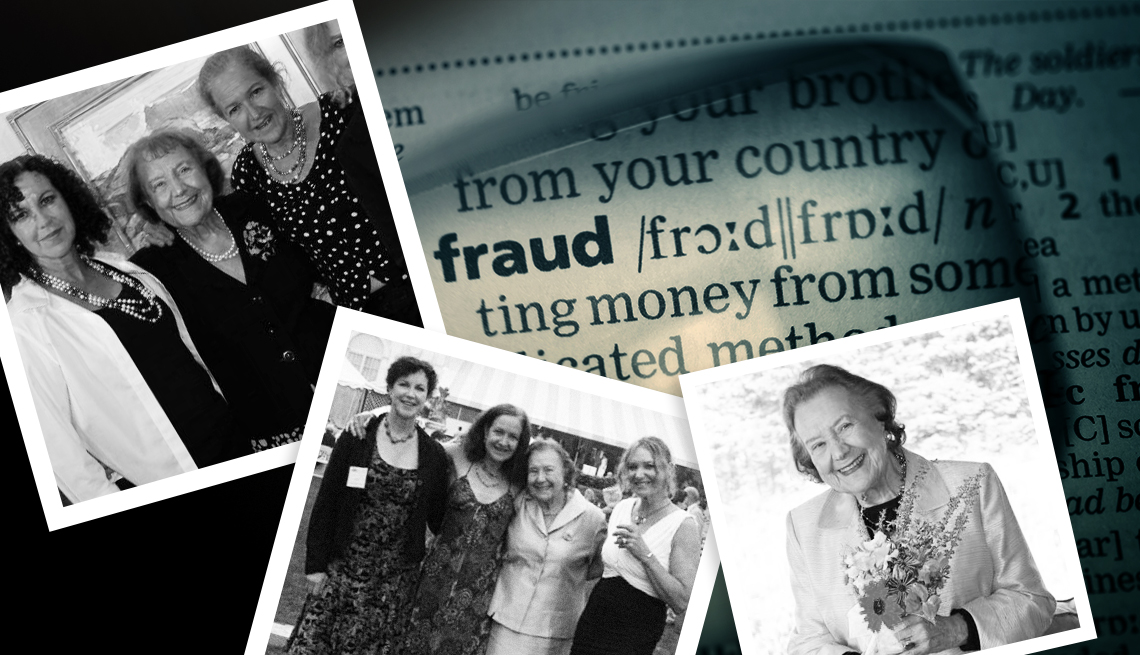
- Select a language for the TTS:
- UK English Female
- UK English Male
- US English Female
- US English Male
- Australian Female
- Australian Male
- Language selected: (auto detect) - EN
Play all audios:
The file also contained a credit card statement showing their mother had racked up charges for about $20,000 at a jewelry store. When confronted with the statement, their mother owned up to
buying Christmas presents for the people purportedly working to help her collect her prizes. When the sisters went to the jewelry store seeking answers, a saleswoman remembered their mother
and said she had had watches and gold chains mailed to New Jersey. The checks, the wire transfers, the spending spree at the jewelry store — in the end, their mother had frittered away
almost $100,000 to satisfy the scammers’ persistent requests. CONCERNED YOU OR A LOVED ONE IS A VICTIM OF FRAUD? CALL AARP'S FREE FRAUD WATCH HELPLINE AT 877-908-3360 TO SPEAK WITH
VOLUNTEERS TRAINED IN SPOTTING SCAMS. Valerie Hill had survived tough times in the past. She had lost her husband a month before daughter Abbe, her youngest, was born. She “got things done
through pure drive and will,” Abbe said. During retirement, their mother built an active, independent life in Florida. She dressed impeccably, kept an immaculate home, volunteered, devoured
books and, a gourmet cook, entertained friends, the sisters said. Her secrecy amid so many worrisome signs prompted Alison and Abbe to install a spy camera in their mother’s condo and put
a tracking device on her car. The surveillance showed their mother was getting as many as seven calls a day, Alison said. The callers would tell her they loved her and she was their best
friend but “they were always asking for money,” she added. “I could tell because she’d say things like ‘I can’t do that’ or ‘I can’t afford that. You’re taking all my money.’ ” Publishers
Clearing House has a warning on its website, saying “you NEVER have to pay to claim a prize.” “If someone contacts you claiming to be from PCH, and tells you that you’ve won a prize — then
asks you to send a payment or money card in order to claim the prize — STOP! You have not heard from the real PCH,” it states. Throughout the country, frauds involving prizes, sweepstakes
and lotteries are a persistent problem: There were 142,870 reports of them in 2017, when losses climbed to $95 million, according to the Federal Trade Commission, which aims to educate and
protect consumers. FTC attorney Kati Daffan, with its Bureau of Consumer Protection, puts it plainly: “Having to pay money to collect on a prize is a scam.” Scammers, she added, are “very
savvy with creating as many indicators of legitimacy as possible” and use phony documents, websites and phone numbers and other tools. “What we see is people will trade on a supposed
affiliation with an entity that people know and trust, like Publishers Clearing House.” The scammers who targeted Valerie Hill were manipulative, according to Alison, who used the
surveillance camera to monitor her mother’s responses on the phone. “I’d hear her say, ‘I love you, too,’ ” she said. ALMOST ADDICTED At AARP, fraud expert Amy Nofziger spoke to Alison
after the sisters pieced together the traps that ensnared their mother. “The scammers were essentially able to brainwash the mother and convince her that they were the good guys,” Nofziger
said. “They work in teams so they’re available 24 hours a day and keep the victim under their purview,” she added. “The mom in this case became almost addicted to the scam.” Before the
ordeal began Valerie Hill was “very conservative with her money,” Melanie said. While she would gamble on cruise ships, buy lottery tickets and play slot machines, she’d have a $20 to $50
limit. Alison observed: “It seemed like she was getting a rush from being caught up in it. She was getting excited about getting all this money and all this attention.” Scammers do their
homework, according to Nofziger. “They read books about what to say to women,” she said, “and they figure out what they want or need emotionally, what their core values, dreams and desires
are. And then they exploit that to their advantage.”






